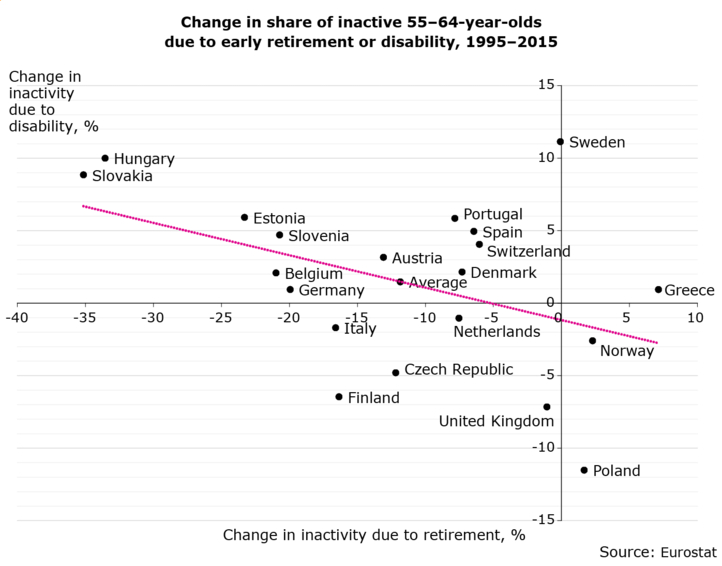Labour market position of 55–64-year-olds has changed in Europe

Nearly half of the 55–64-year-old Europeans were outside the labour market in the mid-1990s. Twenty years later, only about one third were in that position. In many countries, the share of early retirees has gone down, but the changes vary greatly from one country to another.
Researchers Aart-Jan Riekhoff, Kati Kuitto and Liisa-Maria Palomäki (Finnish Centre for Pensions) observed in their study that the share of 55–64-year-old early retirees has decreased clearly in Europe. At the same time, the share of long-term unemployed and those reporting to be inactive due to disability or sickness has increased in some countries.
“It is important to remember that the working lives of the older workers do not always end in early retirement when they end prematurely. There are other early exit routes from the labour market, such as disability pensions, the sickness allowance or long-term unemployment”, Riekhoff says.
In the last decades, the aim in Europe has been to extend working lives as part of pension reforms by, among other things, tightening the conditions for early retirement. In Finland, the early old-age pension was abolished completely in connection with the 2017 pension reform.
Early exit due to disability on the increase
According to the study by the Finnish Centre for Pensions, nearly half of the 55–64-year-old Europeans had exited the labour market in the mid-1990s. Twenty years later, the equivalent ratio was only one third.
In most European countries, the share of older workers exiting the labour market for early retirement decreased, but at the same time, the share of those reporting to be inactive due to disability increased.
Only in Finland, the Czech Republic, Great Britain, Italy and the Netherlands, the share of 55–64-year-olds outside the labour market due to either early retirement, disability or long-term unemployment decreased.
The researchers observed the highest growth in long-term unemployment in the countries that were hardest hit by the recession in 2008. In Greece, not only the number of long-term unemployed but also the number of early retirees and disabled grew.

Old-age poverty may increase
Riekhoff and Kuitto estimate that the measures to extend working lives have been implemented quite narrowly in many European countries, mainly by closing down early retirement routes and raising the retirement age. The researchers find it important that reforms that aim to extend working lives always take into account all the available exit options that a worker has.
”If older workers are prevented from exiting the labour market through one route, they are likely to try another. For example, Mikko Laaksonen’s (Finnish Centre for Pensions) research has shown that the jobseeker activation scheme in Finland increased the number of disability claims in Finland”, Riekhoff points out.
For many older workers, the alternatives to early retirement mean a considerably lower income. Those in a weak labour market position and those who suffer from poor health usually have a shorter working life than others. If the length or amount of social benefits of these older people are cut, many of them are forced to drift between different benefits and looking for work, although the actual chances of getting a new job are slight.
”Our study showed that labour-market and social-policy measures should support workers’ employment opportunities throughout the life-course. Support should be allocated in particular to those whose working lives are to be extended”, Kuitto argues.
The extensive European comparison made by the researchers at the Finnish Centre for Pensions is based on Eurostat’s survey data collected between 1995 and 2015.
The article Substitution and spill-overs between early exit pathways in times of extending working lives in Europe by Riekhoff, Kuitto and Palomäki was published in International Social Security Review in May 2020. The article is subject to a fee. Contact the researchers for a manuscript version of the article.
Photo: Gettyimages

